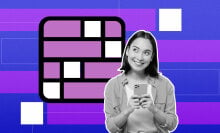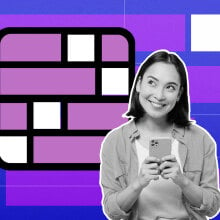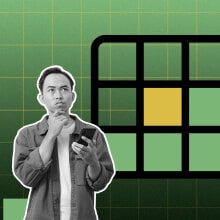American family life has become so challenging that U.S. Surgeon General Vivek Murthy issued an advisory last year, warning that the stressors parents experience take too great of a toll on their mental health and well-being.
Enter Umi, a digital family well-being coach designed by Panasonic Well presented on Tuesday at CES, also known as the Consumer Electronics Show, in Las Vegas.
Yoky Matsuoka, CEO of Panasonic Well, told Mashable that Umi aims to improve family wellness with a unique suite of coaching services.
Imagine a parent who wants to make positive changes, like getting more sleep, eating healthier, or spending more time together as a family, but struggle with brainstorming and executing effective solutions.
Matsuoka said that's where Umi, scheduled to launch later this year, can step in. The conversational AI agent will not only make suggestions, based on the user's specific circumstances, but also offer referrals to the brand's partners, which include the meditation app Calm and the health coaching platform YourCoach. Umi will also help users create "achievable" goals paired with a daily plan and metrics.
"We wanted to build healthy habits through behavior change, to connect those, and make those things into routines," Matsuoka said.
For example, the parent who wants to do less short-order cooking for a child with selective eating tendencies could ask Umi for help, and the agent might respond with a plan to introduce a new food to that child once a month.
But Umi is also meant for multi-generational use, since so many parents are taking care of their aging parents, too. A parent who's also caring for an elder could ask Umi for help with coordinating schedules, finding specific healthcare services, and dealing with burnout. The aging parent could also chat with Umi about their needs.
Umi, however, is not designed to offer medical advice. When relevant, the platform can restrict user functions and share medical and crisis resources when necessary. A parent whose child is experiencing a mental health crisis, for example, will be directed to seek care immediately. Umi also has a built-in safety check identifying violent language.
While Umi can perform certain administrative tasks relevant to helping users set and achieve their wellness goals, it's not a digital personal assistant. Panasonic's Well division has a product for that called Yohana, which can do things like order Halloween costumes, hire a handyman, find a moving company, and research hotels.
Matsuoka, who also oversees Yohana, wants parents to feel less overwhelmed. The name Umi means sea in Japanese, and Matsuoka liked the feelings of calmness and centering the word evoked.
Though Umi uses more than one large language model for its AI, Matsuoka specifically touts the brand's partnership with Anthropic. She noted that the LLM excelled at some of Umi's core tasks, and that she valued what she described as the company's commitment to ethical AI.
While Umi will collect highly valuable data from families about their interests, routines, and preferences, including from teens and younger users who have permission to interact with the agent, Matsuoka said that information will not be sold to third-parties. Umi also isn't trained on user data but instead fake data inspired by what real users have shared with the app so far.
When Umi launches to the public in mid-2025, it will be available via an app, then likely on desktop. Umi's pricing isn't available yet, but Matsuoka said the product's cost will be "accessible" to as many people as possible.
"This problem is not a problem of wealthy people, this is a problem of every family out there," she said.





















